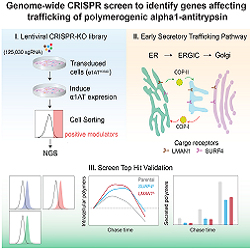
Alpha-1-antitrypsin (α1AT) deficiency is a rare genetic disease which can cause chronic obstructive pulmonary disease and liver cirrhosis. This condition is understood to arise from the intracellular retention of mutant polymeric α1AT, but it is growingly apparent that circulating α1AT polymers also contribute to disease by acting as chemoattractants for neutrophils. A new CIMR publication in Cell Reports has shed light on the origins of these α1AT polymers. Dr Adriana Ordóñez and colleagues from the Ron lab, together with Prof. Stefan Marciniak report on a genome-wide CRISPR-Cas9 screen for genes affecting the intracellular production of disease-causing α1AT polymers. Their surprising discovery was that ER cargo receptors LMAN1 and SURF4 contribute to the export and secretion of α1AT polymers as well as monomers. Polymer retention by ER quality control systems therefore may be less efficient than widely believed and active secretion of polymers may contribute to the clinical manifestations associated with polymerogenic mutations in α1AT.

